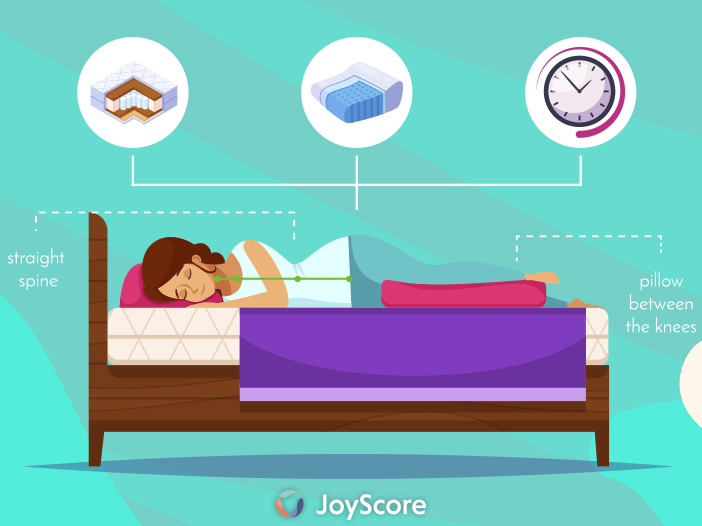“When Sleep is Sound, Health and Happiness Abound”
Sleep is a vital, often neglected, component of every person’s overall health and well-being. One-third of your life goes into sleeping. So, for this, Sleep is important because it enables the body to repair and be fit and ready for another day. Getting adequate rest may also help prevent excess weight gain.
How can I sleep well? These handy tips will help you sleep better and be more energetic and productive for the next day.
Sleeping peacefully influences your mental and physical health. Fall short of it, and it can take a severe toll on your daytime energy, productivity, and even weight. Harmful daylight habits and lifestyle choices can leave you tossing and turning at night and adversely affect your mood, brain, and weight. The cure for sleep difficulties lies in your daily routine.

By following the below-mentioned tips, you can benefit from undisturbed night sleep, boost your health, and improve your thoughts and feelings during the day.
Tip 1 – Make any Every-day Sleep-Wakeup Cycle
Getting integrated with your body’s natural sleep-wake cycle is the best strategy for sleeping well. If you follow a regular sleep-wake routine, you’ll wake up much more reinvigorating. If you’re getting adequate sleep, you should get up naturally minus the alarm. If there is a need for an alarm clock, you may need an earlier bed.
Tip 2 – Fight After-dinner Drowsiness
If you get sleepy way before snoozing, get off the couch and do something delicately bracing, such as a small chit chat with a friend over a phone, or organizing things for the next day. If you surrender to the drowsiness, you may wake up later in the night and have trouble getting back to sleep.
Tip 3 – Say NO to Late-night Television
The light from a TV suppresses melatonin, but many programs are stimulating rather than relaxing. Try listening to music or audiobooks instead.

Tip 4 – Don’t Read with Backlit Devices
Electronics that are backlit are more disruptive.
Tip 5 – Optimize your Bedroom Environment
Eliminate any external light and noise coming into your room and make sure that your room has a comfortable temperature. Use heavy and dark-colored curtains to block light from windows, or put on an eye mask while sleeping.
Tip 6 – People Who Exercise Systematically Sleep Better at Night
Exercising helps in improving insomnia and feeling less sleepy during the day. Easy going exercises such as yoga or gentle stretching in the evening can help promote sleep.

Tip 7 – Take control of what you eat and drink hours before bedtime.
Avoid
- Caffeine
- Smoking
- Big and spicy or acidic meals
- Alcohol
- Too many liquids
- Sugary foods and refined carbs.
Tip 8 – Managing Your Stress Levels
Work stress, anxiety, and irritation from your day can make it impossible to sleep undisturbed. If you can manage your overall stress levels and learn how to curb the worry habit, it can be easier to unwind at night. You can also develop a relaxing bedtime ritual to prepare your mind for sleep, such as taking a warm bath, softening the lights, and listening to soft music or an audiobook.
Maybe, like most of the people, you’re continually interrupting tasks during the day to check your phone, email, or social media. Help yourself by assigning fixed duration during the day for checking your phone and social media and trying to focus on one task at a time. By doing so, you’ll be better able to rest both your mind and body. Deep breathing exercise helps you relax and sleep. Concentrate on breathing from your belly rather than your chest, which activates the relaxation response and decreases your heart rate and stress levels to help you drift off to sleep.
Tip 9 – Enhance your Sleep Enclosure
A peaceful and calm bedtime routine and ritual will send a relaxing indication to your brain that it’s time to call it off for the day and let go of all the stresses. Sometimes radical changes to your environment can make a big difference to your quality of sleep.
- Maintain your room dark, warm or cold, and quiet as per the scratching summers or the chilly winters.
- Keep the noise down. If you can’t avoid noise from neighbors, traffic, or other people in your household, try masking it with a fan or sound machine. Earplugs may also help.
- Keep your room fresh. Most people sleep best in a slightly cold environment (around 65° F or 18° C) with enough ventilation. A bedroom that is not conducive to the outside temperature can cause disturbed sleep.
- Make sure your bed is clean and cozy. Your bed covers should leave you sufficient space to stretch and turn comfortably without entangling. If you frequently wake up with a backache or an aching neck, you may need to experiment with different mattress firmness levels, foam toppers, and pillows that provide more or less support.

Tip 10 – Learn Ways to Get Back to Sleep
It’s normal to wake up in intervals throughout the night, but if you’re having issues resuming your asleep within 20 minutes or so, try these handy tips:
- Get out of the bed and go to another room
- Don’t stare at the clock
- Get relaxed. Focus on the feelings in your body, or practice breathing exercises to keep out of your head.
- Try a body relaxation technique such as muscle relaxation, or meditation, which can be done without even getting out of bed. The relaxation will release the stress out of mind and body giving you a peaceful sleep.
Tip 11 – Aromatherapy and Warm Baths
Usage of essential oils before bedtime gives a nerve-calming and relaxing experience. Applying these oils on your temples, forehead, and wrist can de-stress you to a great extent. You can also have a warm bath adding this essential oil to water.
THE BOTTOM LINE
Sleep has a significant role in your physical and mental health. Insufficient sleep has been linked with an increased risk of obesity in adults as well as children. If you’re interested in optimal health and well being, it’s recommended that you rank sleep the number one priority and incorporate some of the tips above.
But, if you’ve always struggled with sleep, it may be wise to consult your healthcare provider.



